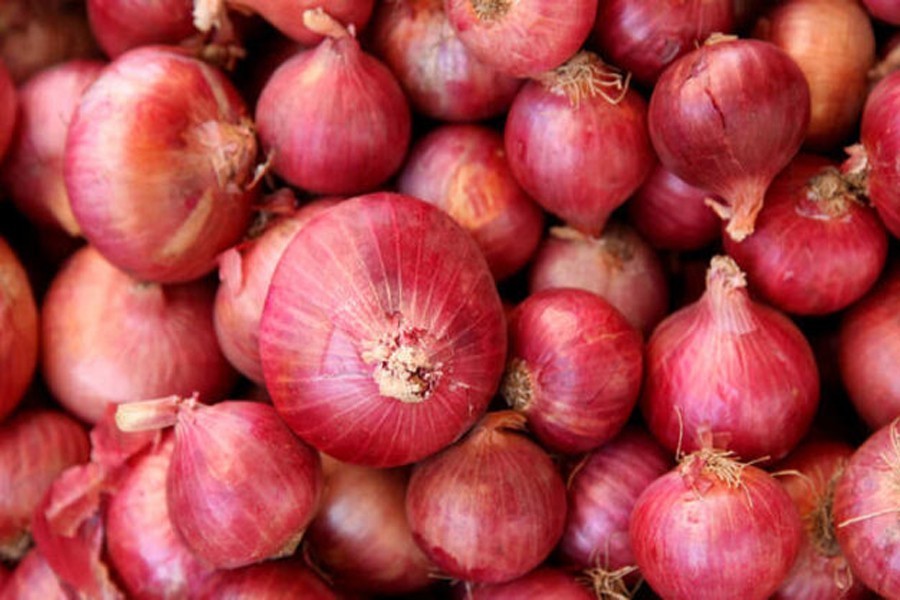Celebrated Chilean poet Pablo Neruda was once invited to a lunch by his friend. The friend took him around beautifully groomed garden full of fruits, flowers, vegetables and spices including onion. Surprisingly his attention was drawn to an ordinary spice called onion and instantly wrote the famous "Ode to the Onion"
Onion,/
luminous flask,/
your beauty formed/
petal by petal,/
crystal scales expanded you
...............
You make us cry without hurting us./
I have praised everything that exists,
………………….
By the time this piece of write-up goes to the press for printing, the onion market in Bangladesh passes through a very rough weather. The rampant rise in prices is putting pressure on common consumers' budget. In fact, during the last weeks or so, the market swings surprised consumers as well as policy makers. "You make us cry without hurting us" implies that tears roll down while cutting onions but today in Bangladesh onion has been making us cry by hurting in terms of its prices that soared from Tk 20-30/kg last year to more than Tk 250/kg this year! As newspaper reports tend to show, even on last Monday, price rose by Tk 10-20 per kg.
Delhi was once gripped by the steep rise in onion prices. People's protests against onion price hike cost the government enough popularity and power there. It is for the first time in our history that prices of onion soared this sky-high.
What are the factors behind the crisis? They are mostly economic, political including governance and socio-economic. Simple demand-supply theory can duly explain the current concern. The demand for onion is much higher than supply, domestic or imported. Immediate imports from India rescued us in the past but postponement of export this year, obviously for India's internal interest, aggravated the problem. In 2008 also, for example, Bangladesh faced a serious setback when India refused to export rice to Bangladesh. Number two economic reason is the paucity of proper data on demand and supply, storage and spoilage. Also related to this is the lack of proper supply chain, incentives, research to augment supply of non-rice commodities. Politically powerful ones or well-connected with existing power are alleged to have formed a syndicate to create a crisis in the market and take home rich profits. If business people could extract extra Tk150 per kg, how much money have been drained off the pockets of producers at the cost of tears of consumers? In this context, not to forget that market monitoring is very weak and unreliable in Bangladesh. It works like disaster management - only during the crisis.
Unfortunately in Bangladesh, business people are doing politics while politicians are doing business. Due to this conundrum, it has become increasingly difficult to take actions against the actors behind anarchy in commodity markets, rice market, share market, tender processing, etc. About 300 years ago, Adam Smith argued that two businessmen whispering means they are conspiring against consumers. On the social side, it is the rumour that went to ruin the market stability. One of the important determinants of demand for a commodity is the expectation about future prices. If a consumer expects from his own perception or from horse's mouth that the prices of onion would shoot the roof soon, he would unhesitatingly, even by borrowing, buy sacks of onion to store house. Conversely, he would buy less now if low price is being perceived. Usually, syndicates spread the rumours as they are aware of country-wise production. But consumers also have a role to play in this volatility of onion market. Usually in a family of five, five kgs of onion is required; but what is the problem if that family reduces it to 3-4 kgs during the short-lived crisis. After all, onion is not as staple a food here as it is in Delhi or Lahore.
Apparently, there is reason to raise a hue and cry over the sudden rise in agricultural prices, as theoretically, the price hike should benefit farmers and incentivise them to grow more food. The Japanese have to pay for rice much more than the world price but still they don't import rice just contemplating the contributions of famers in building modern Japan. Why should we raise hue and cry over a rise in prices of rice or onion if we want to see our farmers live well?
But theory is far from empirics in Bangladesh. We would be happier to see that farmers did benefit from the extra price at retail level but no price transmission from retail points to the farm gate took place. The whole forfeited sum allegedly has been pocketed by the powerful syndicate with strong political lobby. As rats swallow the profited molasses, the syndicate swallows the sweet following from exorbitant rise in onion prices - extra Tk160 per kg!
No doubt that tears roll down the cheeks while cutting onions into pieces - Pablo's onion makes us cry without hurting; it is the tears for loving onion as a special spice that we like to see in our curry. But this time, tears roll down from a serious shock emanating from skyrocketing price of onion. Unless the syndicate can be taken to task, supply can be augmented in due time, supply chain developed with research, extension and incentives, onion will continue to make us cry and hurt. The problem would be solved soon but the saddest thing is that the lessons to be learnt remain pending.
Abdul Bayes is a former Professor of Economics at JahangirnagarUniversiity and currently an Adjuncy Faculty, East West University. [email protected]


